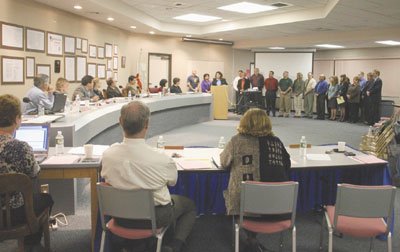Gilroy
– If the district had chosen a year ago to hire a local
nonprofit to tape its meetings, it could have saved more than
$4,000 in 2006 and parents could have been watching the meetings
live.
Gilroy – If the district had chosen a year ago to hire a local nonprofit to tape its meetings, it could have saved more than $4,000 in 2006 and parents could have been watching the meetings live. Partnering with the organization also could allow for the future possibility of having the meetings streamed live on the Internet and archiving past meetings through an online database.
The nonprofit is not taping the meetings, however, because an offer it made through a district official was not done through the proper channel and was thus not considered, said Teri Freedman, the district public information officer.
Community Media Access Partnership – which broadcasts hundreds of government, school district and organization meetings in Santa Clara and San Benito counties each year from its studios at Gavilan College – will tape up to four hours of the Gilroy Unified School District meetings for $80 and transmit it live on its community television station at no extra cost. Using the organization would present a savings of about $4,080 per year, as the current company taping meetings – Multipoint Media – charges $250 per meeting. In addition, San Jose-based Multipoint does not broadcast the meetings live and must pass the tapes on to CMAP to air at a later date.
“It’s obviously a cost savings so we should definitely explore that,” said Trustee Denise Apuzzo, who joined the board after the offer was made.
CMAP plays the meetings Friday, Saturday and Sunday at 7pm, after the district drops off the tape Friday morning.
In about six months, the nonprofit will also be able to stream the meetings online so that people can watch the board meetings on their computer, said Suzanne St. John-Crane, executive director of CMAP.
The City of Gilroy streams city council and planning commission meetings live and has been posting the videos online since 2003. CMAP does not yet have an online archiving service available, but is willing to explore that option, said St. John-Crane.
However, the organization’s participation with the district has been stymied by miscommunication between the two parties.
The nonprofit has been waiting for more than a year for the district to respond to an offer it made in late 2005. However, Edwin Diaz, the former district superintendent, made a decision not to use the organization without telling CMAP. He said in an interview with the Dispatch in January 2006 that the quality of the CMAP’s taping of a study session in 2005 was not up to par with Multipoint.
When told about Diaz’s comment last week, St. John-Crane defended the quality of her organization’s recordings. The audio might not have been great in the recording because there was only one microphone in the room but the equipment and employees are professional quality, she said.
“We’re not using home movie cameras, you know,” she said. “This is what we do.”
Diaz also said that trustees had agreed with him on the decision that the nonprofit’s quality was not sufficient. However, Tom Bundros, president of the board, does not remember agreeing to this.
Similarly, district officials were unaware that Diaz had made a decision and gave a different reason than Diaz for not taking CMAP’s offer. The reason that the organization’s offer had not been considered was because it had not gone through the proper channels, said Freedman. CMAP had assumed in late 2005 that Rob van Herk – the district manager of technology and representative to the CMAP board at the time – would move forward with the offer, said St. John-Crane.
In order to be considered at this point, CMAP would need to make a proposal to Steve Brinkman, assistant superintendent of business services, Freedman said.
CMAP’s offer would not necessarily be accepted, said Brinkman. The district would likely open up the contract to a bidding process, in which CMAP could take part.
Even still, the issue of who tapes the meetings is just not a high priority for him because it pales in comparison to other expenditures, said Brinkman.
“We’ve got an $83 million budget. This rounds out to the fifth decimal,” he said.
The issue is not a priority for the board either as it has more pressing issues to tend, such as an ongoing superintendent search, said Bundros.















